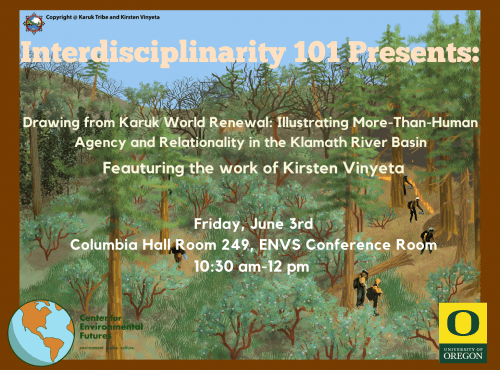Join us for the year’s final Interdisciplinarity 101 talk, next Friday, June 3rd at 10:30!
This month’s location has changed to be in Columbia Hall in the ENVS Conference Room, room 249. Our speaker is Ph.D. candidate Kirsten Vinyeta, who will present the last chapter of her dissertation which focuses on visual methods, and specifically illustration, as a valuable and expansive methodology in Indigenist research. Below is the abstract of her recently published article, titled Under the guise of science: how the US Forest Service deployed settler-colonial and racist logics to advance an unsubstantiated fire suppression agenda:
Over the last century, the United States Forest Service (USFS) has reversed its stance on the ecological role of fire – from a militant enforcer of forest fire suppression to supporting prescribed fire as a management tool. Meanwhile, the Karuk Tribe has always prioritized cultural burning as a vital spiritual and ecological practice, one that has been actively suppressed by the USFS. This article examines the discursive evolution of USFS fire science through the critical lens of settler colonial theory. A content analysis of agency discourse reveals how the USFS deployed anti-Indigenous rhetoric to justify its own unsubstantiated forest management agenda. USFS leadership racialized light burning by deridingly referring to it as ‘Piute Forestry.’ The agency has also discredited, downplayed, and erased Indigenous peoples and knowledges in ways that invoke tropes of the ‘Indian savage,’ the ‘Vanishing Indian,’ and the concept of ‘Terra Nullius.’ It wasn’t until the 1960s – in the context of the Civil Rights and American Indian Movements – that the USFS began contemplating the value of prescribed fire. This research illustrates the complicated relationship between the settler state and Western science, as well as the malleability of scientific discourse in the face of changing social contexts.
We hope to see you there!

